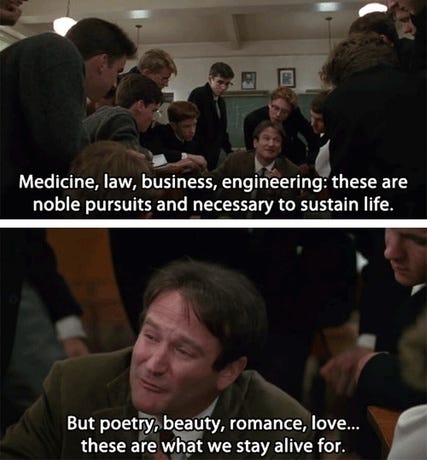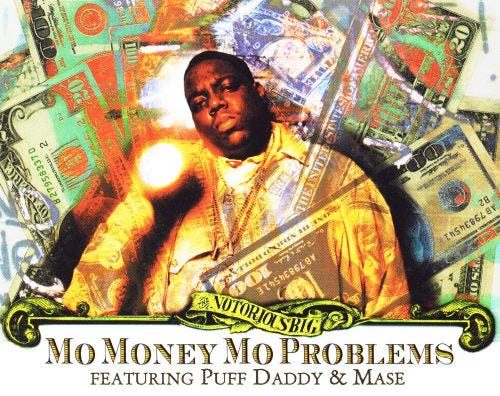I’ve always found 18 to be a silly age for legal adulthood. Some people are children well into their twenties and thirties (and forties and beyond, let’s be real); others grow up much earlier due to life circumstances. But I understand the need for bright-line rules: the government can’t individually evaluate maturity. Age is a proxy for responsibility.
There are many formulations of adulthood, but I’d argue the standard is when we first weigh passion and stability and ultimately choose, of our own volition, stability. That moment, when we acknowledge the full weight of Responsibility, marks the severing between childhood and adulthood.
Stable paths are by definition known paths—predictable because many have traversed those same routes before. There is a reason that law school applications are up 22.9% at ABA-accredited schools: periods of economic and social instability drive people to flock to career paths perceived as stable, such as law. When the world feels uncertain, hiding in grad school is as alluring of a path as any. Respectable, too—no one will question why you’re in law school, the same way they might question why you’re working retail (even if the goal of both is to simply wait out a tumultuous economic period).
Whenever I am seen as “respectable” because I’m a lawyer or because I went to Harvard Law School, it strikes me as ironic. I mostly feel like a coward for having done so—it was an expensive, coward’s way out of this Big Life Question of what to do with my life. I didn’t know, so I decided to hide out in law school; I could have just as easily hidden by moving home and working in retail. The only difference is one way of escaping life is lauded by society; the other is seen as a “waste” of my degree.
Every so often, I online-stalk this girl I went to college with. She pursued writing directly afterwards. If the Devil appeared to me and asked if I would trade my firstborn child for her career, I’d probably say yes. She is everything I’m not: an MFA from a prestigious program, author of multiple novels, and co-writer on one of the TV adaptations.1
I want her career more than any other classmate’s—which is saying a lot because I also went to school with a crypto billionaire, the Director of the Oregon Health Authority, and a socialite who’s an influencer and an ecommerce exec and had her wedding at the Four Seasons where the second season of White Lotus was filmed.

Unless you were born wealthy and don’t need to make the trade-off between passion and stability—or are somehow already self-actualized—the tendency to look over your shoulder at the road not taken is inescapable. This classmate I am so jealous of—I know she’s contemplated the more “stable” path of law, too. Some of the characters in her books are attorneys at Biglaw firms, representing stability and tradition. Tradwife, tradhusband, tradjob. It’s discomfiting to see these characters and realize that while I’ve been busy looking at her, she’s also been looking at a version of me. A double mirror of passion and stability, my gaze never quite settling comfortably.
When do you grow up? When do you decide to call it quits on passion—after five years? After you turn 40? When you have kids and need to start saving for their college tuition?
But the world is also full of stories about people who never quit. Part of the strategy for succeeding in something non-traditional, then, is simply outlasting everyone else, staying consistent as others give up.
Do I dare keep hacking away at my dreams for another fifteen years, until I’m 49 like Adam Scott was when Severance premiered? It’s hard not to see it as a gambling addiction—if I just stay in the game a little longer, I’ll finally make it big. But that’s also the definition of insanity: continuing to do the same thing and expecting different results.
Besides pleasing immigrant parents, there is a real case for pursuing stability: Maslow’s Hierarchy of Needs. Developed by the American psychologist Abraham Maslow back in 1943, it is depicted in this pyramid structure:
At the bottom are physiological needs—biological requirements like air, water, food, shelter, clothing, sleep—and then safety needs, like physical and financial security and having safety nets. Love and belonging (social needs), esteem, and self-actualization are at the top.
Looking back, I realize my parents and I clashed so much growing up because they were approaching my life in America from a very different tier of Maslow’s Hierarchy than I was. They were obsessed with Safety, because those were the things they didn’t have in China, came to the U.S. for. Meanwhile, I did feel like I had a safety net growing up in the U.S. (Well, sort of. As long as I got straight A’s and wasn’t gay…)
Because I didn’t have to worry about events like the Cultural Revolution taking away all my Safety and Physiological needs, I could focus primarily on the upper three tiers: Love & Belonging; Esteem; Self-actualization. Those are the passion tiers, whereas Physiological and Safety are the stability tiers. And you do need the stability ones in order to more successfully reach the passion tiers.
But don’t take my immigrant parents’ word for it. The writer Elizabeth Gilbert writes in Big Magic that she kept her day job even when she was a published author:
I held on to those other sources of income for so long because I never wanted to burden my writing with the responsibility of paying for my life. I knew better than to ask this of my writing, because over the years, I have watched so many other people murder their creativity by demanding that their art pay the bills. I’ve seen artists drive themselves broke and crazy because of this insistence that they are not legitimate creators unless they can exclusively live off their creativity. And when their creativity fails them (meaning: doesn’t pay the rent), they descend into resentment, anxiety, or even bankruptcy. Worst of all, they often quit creating at all.
Put too much pressure on your creativity; strangle your own art. There’s a reason Maslow’s Hierarchy is presented as a pyramid. If you try to find all your Physiological and Safety needs in the Esteem tier (the one for work), it’s a lot of weight for not much surface area.
But there is something to be said for prioritizing passion first—remaining a child for as long as you can, with all the irrationality and hope childhood carries. The actor Steven Yuen was originally pre-med in college, majoring in psychology with a concentration in neuroscience, because his parents wanted him to become a doctor. After discovering acting, he made a post-grad pilgrimage to LA to pursue acting. He gave himself two years to try. Lo and behold, six months later, he landed his breakthrough role in The Walking Dead.
I think about this a lot. I imagine lots of people do, which is why we love reading profiles about actors and singers and entrepreneurs and those who dared. If I’d tried pursuing passion first, it certainly could’ve been humiliating. But what if it’d worked out? Wouldn’t I be years into living my dream right now? Have many more years of living that dream?
The other underrated benefit of pursuing passion first: you have more time to practice your passion, your craft. Since I’ve stepped back from law, I’ve taken writing classes, read so many more books—all things I wish I could’ve done this past decade, when instead I was developing my legal chops and reading statutes and judicial opinions. At the time, I didn’t realize the opportunity cost of law—it taught me new skills, which is great, but it also took away from time to work on the skills I wanted to develop.2
Ideally, you could pursue both passion and stability: all rungs of Maslow’s Hierarchy. Dead Poets Society had it right:
Except there are two problems with trying to have it all. First, we live in an era of “greedy” work. That’s what social scientists call professions like finance, law, and consulting, which pay employees disproportionately for close to 24/7 availability and “seek exclusive and undivided loyalty” from them. These jobs are “good” in that they do provide stability—but they over-index on Physiological and Safety needs, while leaving little time for the others. (This was the bizarre state I found myself in when contemplating leaving law firm life: I no longer wanted more money; I wanted time.)
The other problem: having more money doesn’t actually help one’s feeling of stability even as the objective stability of one’s bank accounts is bolstered. The anxiety of wealth is well-documented—from Cicero’s tale of Dionysius and Damocles to a survey of the ultra-wealthy summarized in The Atlantic. Most respondents in this survey—where the average net worth was $78 million—said they didn’t consider themselves to be “financially secure;” they would need 25% more wealth than they already had.
Does this perfect job exist, then, that would permit this perfect balance between stability and passion? A day job that somehow also allows you the time and energy to exercise, care for family, rest, and pursue your passion? (If you have such a job, drop it in the comments—I have one more graduate degree in me!)
Otherwise, it seems the only way to balance passion and stability in modern life is to seek seasonality, rather than balance. Due to greedy professions and the rising cost of living, we can’t achieve equilibrium day-to-day. But if we zoom out to several years, a decade, then it becomes possible.
Several years in stability; several in passion. And no, it doesn’t matter which you pursue first. I personally wish I’d started with passion instead of stability. But if pursuing passion right now over stability feels too scary to you—do you! If you cannot mentally function without some Dream Amount of Money, then by all means, get that bag so you can feel more secure—and also spend some of it on therapy. Because it turns out that only therapy, and not more money, can ever help you feel secure in this world.
How do you know when it’s time to change seasons, though? When you find yourself losing passion for your passion or sacrificing your soul for stability. It’s this part—the changing of seasons between passion and stability—that is challenging. Start with stability, and you’ll get accustomed to a level of security you’ll have to one day turn away from. That’s hard. But start with passion, and one day you’ll be sitting at your desk job reading about your friends’ smash successes, wondering if that would’ve been possible for you, too, had you stuck it out longer. That’s also hard.
So don’t get the choice twisted. The question isn’t between passion and stability. Both are necessary to life. The real question is: will you be decisive enough to choose and courageous enough to switch? ◆
Thank you for reading debrief! If you enjoyed this post, consider upgrading your subscription or sharing this post:
Becoming a paid subscriber gives you access to my inner sanctum—essays and private podcast episodes on nascent ideas—as well as archival posts older than six months. Subscribing also helps ensure that my informational and educational video content on all other platforms remains freely available to all.
Please know, though, that having you here and being able to be in conversation with you is the most important thing to me. If you are a student without disposable income, un-or under-employed, or a minimum-wage worker, just email me or fill out this form and I’ll comp you a free subscription, no questions asked. If you’d like to donate one of these subscriptions, you can do so here.
I’ve said this before, and I’ll say it again—if you don’t know what you want out of life, paying attention to whom and what you’re jealous of can be very revealing. It’s much easier to notice our jealousies than it is to notice our desires.
This is true for networking, too—the earlier you are in an industry, the more time you have to meet people in said industry.




















Share this post